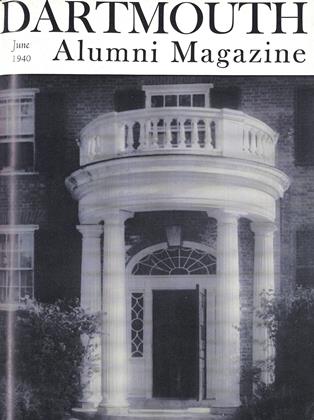by Ben Ames WilliamsJr. '3B. The Macmillan Company, New York,1940. pp. 507. $2.50.
A FAIRLY LARGE NUMBER of individuals have by now appeared on the American political scene whose personalities and behavior have aroused a puzzled curiosity in later generations. Among them is Edwin M. Stanton, Secretary of War under President Lincoln and, for a stormy time, President Johnson. Oddly enough, no adequate biography of him has appeared since his death, in spite of the considerable controversy which has developed at times about his career, and his great importance in the Civil War. This neglect was made more striking by the publishing in 1937 of Eisenschiml's rather unsubstantiated book on Lincoln, which advanced, among other theories, some much to Mr. Stanton's discredit.
Mr. Secretary is an interesting attempt to answer the Stanton mystery—interesting not only as the second book from the Williams' family to be reviewed here this month, or as a book by a young author quite able to stand on its own merits. It is, more than that, a visible return from the Senior Fellowships, for the book was planned and largely written during Mr. Williams' senior year as one of the select few. It gives as if in Mr. Stanton's own words the story of his life from his birth to the peak of his power in 1867. It shows with great skill a psychopathic individual, unstable, ambitious, uncompromising, unscrupulous to the point of intellectual dishonesty but capable always of seeing his path as the only correct one. At the same time it shows clearly his tremendous ability, especially in the war pages. But the theories of his sabotaging the conduct of the war, and his indifference to or even share in the murder of the President, while they may hang dramatically on the character so well developed, must remain I think still theories. This it seems to me is the trouble with the device of the fictional autobiography. If the object is entertainment, there is no quarrel; if it is the serious presentation of a man's life based on a careful study of even a fair amount of the material available, the result is simply not historical. And I trust that Mr. Williams would, himself, admit that the chief value of the book is in the development of a personality and the presentation of several extremely interesting but unproven theories. Certainly the book is one to be read by all interested in Lincoln, and induces the hope that Mr. Williams will continue in his chosen profession.
 View Full Issue
View Full Issue
More From This Issue
-
 Article
ArticleGordon Ferrie Hull
June 1940 By STEARNS MORSE PROFESSOR OF ENGLISH -
 Article
ArticleIn Reply to Mr. Qua
June 1940 By Judicial Temperament, JOHN G. GAZLEY -
 Sports
SportsBig Green Teams
June 1940 By Whitey Fuller '37 -
 Class Notes
Class Notes1915*
June 1940 By CHARLES R. TAPLIN, RUSSELL B. LIVERMORE -
 Class Notes
Class Notes1931*
June 1940 By CHARLES S. McALLISTER, CRAIG THORN JR. -
 Class Notes
Class Notes1930*
June 1940 By ALBERT I. DICKERSON, G. WARREN FRENCH
Books
-
 Books
BooksTen Introductions a Collection
January 1935 -
 Books
BooksL'AMOUR EN BOUTON,
January 1951 By ARTHUR M. WILSON -
 Books
BooksPROPAGANDA COMES OF AGE.
NOVEMBER 1965 By CHAUNCEY N. ALLEN '24 -
 Books
BooksBOTANY.
MARCH 1963 By GEORGE M. WOODWELL '50 -
 Books
BooksOPTICS: AN INTRODUCTION FOR OPHTHALMOLOGISTS.
May 1961 By GORDON H. GLIDDON -
 Books
BooksNative Wood-notes
JUNE 1983 By Wilfrid Mellers

